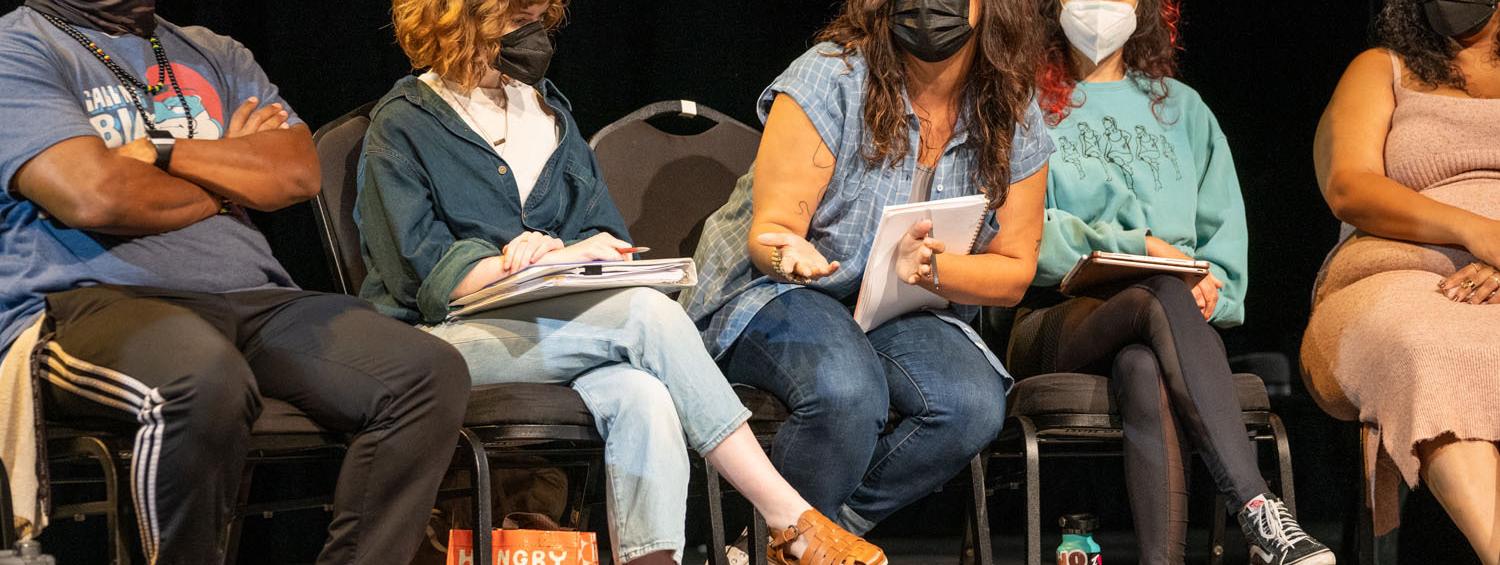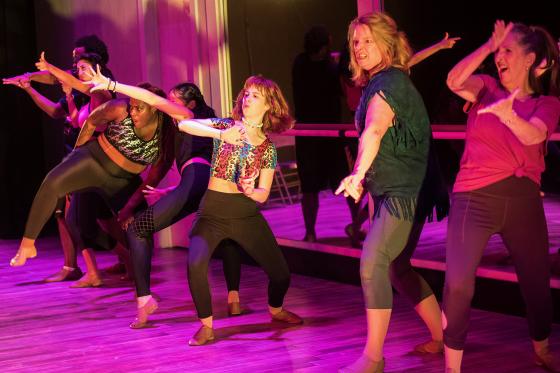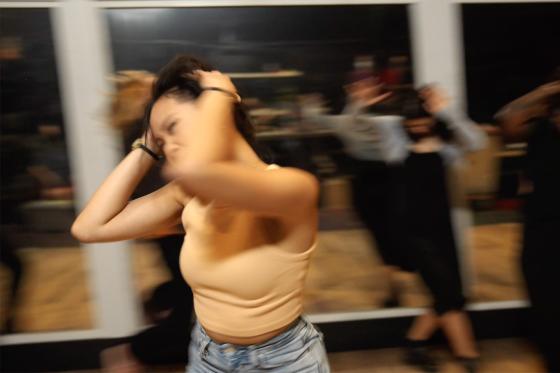Olney Theatre Center’s 2022-2023 season has started off with a bang with the opening of Clare Barron’s Dance Nation, an Off-Broadway smash that was also recognized as the winner of the Relentless Award and a Pulitzer Prize finalist. For context, the show centers on the experience of a tweenage dance team from Liverpool, Ohio as they navigate the high-pressure and hyper-competitive world of dance while also navigating the ups and downs of puberty.
The lead up to an important regional competition proves to be the catalyst for several of the girls on this team to reconsider their relationships to one another as well as to dance itself. Most notably, star dancer Amina must grapple with the pressure that comes with her incredible gift, while her best friend Zuzu, who has spent years playing second fiddle to her talented friend, must ask herself whether she really has what it takes. The play also incorporates several unique impressionistic touches, among them the use of adult actors to play these pre-adolescent characters, which in our production includes cast members ranging in age from their twenties to their sixties.
I caught up with Jenna Place, the director at the helm of this exciting project, to get a few of her thoughts on this one of a kind play, her long history with the Olney Theatre Center, and her own journey through girlhood and through the theatre industry. Our conversation has been edited for content and clarity.
IJ: So, what’s your history like with the Olney Theatre Center, and what initially attracted you here?
JP: That is a great question, but fair warning it’s a long answer. It goes a while back! I was an apprentice here in 2013 - a tumultuous time for Olney for those who know the history. Jason Loewith had just taken over as Artistic Director when I started, more on that in a bit. Prior to my apprenticeship, I had spent a summer in college working at Westport Playhouse in Connecticut. Through this and general interest in how theater adapts to a changing world, I had gotten really interested in this idea of old established regional theaters with a lot of history that are trying to renew and revive themselves. I love the lore, the ghost stories, and of course the tremendous list of artists with ties to a theater in its 80s. I do think it makes it special, but I also think it takes the right leader to retain what is interesting about that and reevaluate what in that history has been a barrier to potentially more exciting work and a wider audience. So, back to 2013. I was graduating George Washington University in DC and I knew of Jason Loewith through the National New Play Network (I followed NNPN because one summer Jojo Ruf was my camp counselor – true story. The world is tiny.) So when Jason got the job as Artistic Director, I knew I was interested in applying to the apprenticeship there. (I also have a love of rep companies. I care a lot about making work around actors’ strengths, which is why I enjoyed casting once I got into it. And I knew about and was really drawn to National Players, which is still a big part of what I love about Olney Theatre.)
So I applied, and I got it, and somehow time has flown and I’ve been able to spend the last almost ten years watching Olney turn into the kind of place that programs Dance Nation - which is more than I ever could have expected when I was an apprentice thinking it would be good to spend a year here. After I got out of the apprenticeship, I stayed in DC (doing some casting, Assistant Directing, some dog walking to pay rent…you know how it goes). And in the meantime I kept up with Olney. I directed The Giver for National Players during that time, I associate directed Midsummer for both Jasons (Jason King Jones and Jason Loewith) who co-directed it. And I then did some freelance casting for them when they didn’t have a casting director. And then right when I was like, I probably should start to get out of this career if I can’t find something that’s gonna be full time, Olney posted the search for an Associate Artistic Director/Casting Director. So I got it, and I’ve now been here in that capacity for five years.
IJ: When did you first encounter the script to Dance Nation and what was your initial reaction to it?
JP: An actor friend of mine in DC texted me when she saw it Off-Broadway. And I wish I still had the text, because it was like the nicest thing anyone ever said to me. The gist was: “I just saw this play, it changed my life, you have to direct it in DC.” (I didn’t know anyone would think I was up to the challenge, so that text changed my life a little bit in retrospect!) Anyway, I knew Clare’s other work (I had done the casting for Animal at Studio Theatre, which was another play of hers that’s spectacular), and I knew I was really drawn to it, and I knew Olney was interested in it, and then when we were thinking about it for season planning I read it and it rocked my world. At that time, though, I was more part of suggesting other directors than being considered for the season myself, and it felt really naturally in the wheelhouse of Paige Hernandez, who was supposed to direct it originally. So I got to cast part of it for Paige before the pandemic (though now there’s only two cast members from that first round who are still in it because of many pandemic delays, so I got to do most of the casting for my production in the end). But I got to spend a lot of time with the script during that process now three years ago before I ever thought this would happen, and getting to explore it with Paige was incredible because she’s been a role model of mine for a long time and I always learn hugely from working with her.
IJ: How have your personal experiences and background informed your vision for this play?
JP: I was a pretty intense athlete in high school. I was a ski racer primarily, but I also played soccer and lacrosse and tennis and was a cyclist…and I swam — I did all the things! But ski racing I was doing at a national, highly competitive level. It was my whole life, and I went to a ski racing academy in Vermont, where I’m from, which essentially means you do your schooling around your competitions. It gives you the time in your day to train and compete. You live with your teammates/schoolmates, and you travel with the same people, and you play with the same people. So, much like dance, you’re in a highly competitive environment of doing something that even the worst people on the team are insanely good at, and sharing every aspect of your lives which all revolve around this same thing. For me, while I loved the sport, it wasn’t an easy environment for friendship. So I hung out with the boys a lot, and I sort of thought girls were mean. And then, as I grew up, I realized that that was the patriarchy’s fault, society’s fault, the fault of the men in our world constantly setting us against each other…and that women are actually incredible. As an adult, every day I feel like I learn more and more how much high school was not the fault of any single girl that was in that space. We were being taught that success is defined by winning in this one activity that you’re supposed to be excellent at, and that is more important than your relationships. Now I realize the men in my world weren’t forced to make that choice in the same way. And I left that world for college. It taught me so much, but I wanted out, because it had hurt me, and it was really hard to give up my identity like that. All of that is so deep in this play. I feel like I both understand Amina and all the things she needs to give up to be successful, and I understand Zuzu for wanting to do something that ultimately gives her the chance to have a life.
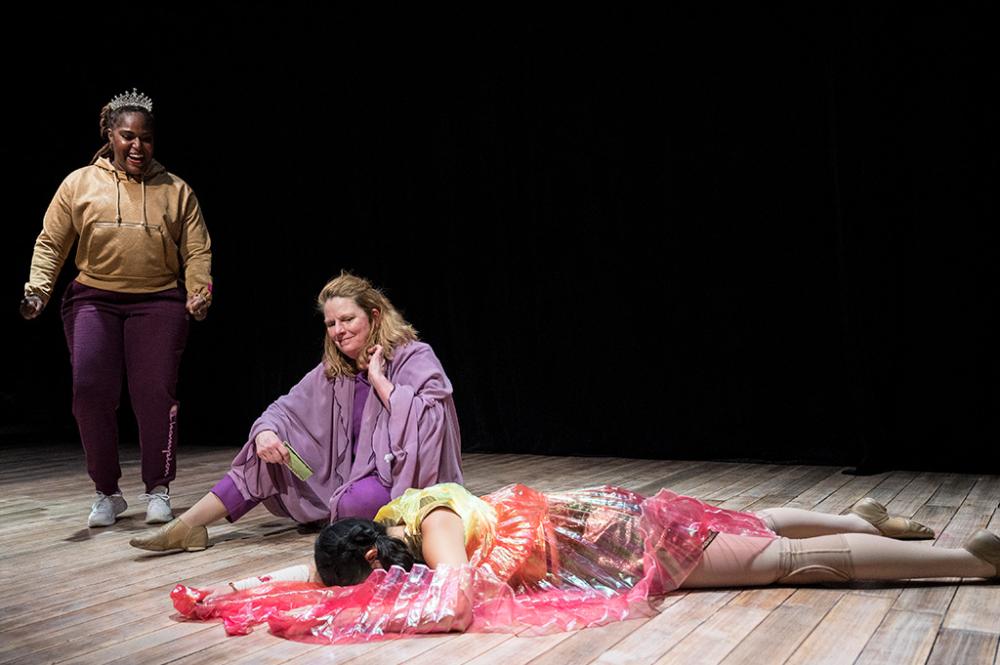 Image credit
Image credit
IJ: How has the rehearsal process been so far?
JP: It’s been just a dream. The actors and team have been brilliant and eager to dig deeper in the text each day, and generous. They are generous with each other, with me, with Clare—who’s not in the room of course –but I mean generous with her in terms of giving real gravitas and attention to the words she’s given us, finding such truth in those words. I think it has been as good as a process can get.
IJ: What parts of the rehearsal process were most difficult to navigate?
JP: Well, there’s a lot of dance in the show. As somebody who’s cast a lot of musicals, I do a lot of dance calls, and I can say we definitely did not have a dance call since Clare says in the script it’s better if these girls are not good dancers. So that’s sort of what I was expecting, but then we got in the room with our brilliant choreographer Nikki Mirza, and then everyone in the cast could move incredibly well! So all the sudden, there was real dance opportunity. So I think what really changed the process in a good way was the ability to focus on integrating the storytelling in both the dance and the acting in ways I didn’t know I was going to be able to. I wasn’t sure if the dances were gonna be simpler then what they are now. But now we access whole chunks of the story in the dance, which was obviously a big chunk of learning to add to our short time. But the cast tackled it with incredible tenacity and grace. This group of people knows how to jump safely and open-mindedly into the unknown.
IJ: How has being a woman in theatre affected your experiences and have you dealt with people taking you less seriously and things like that?
JP: I’ve tried to find role models in women who are doing it better than I’m doing it and follow their lead of not letting the patriarchal crap cut into to the essence of them being excellent artists. I try to work with them, which I absolutely am in this show as actors and designers and choreographers. I try to watch them work. I’ve been lucky to do that a lot in casting rooms. Directors like Paige Hernandez, Holly Twyford, Eleanor Holdridge, Natsu Onoda Power…they’ve been really key in me figuring out that you can be kind and powerful and true to your vision all at once. You can run a patient and generous room and also stand fiercely by your goals. I’m still learning to find that balance, but I know it’s possible because I see it in them. One time, I did have someone tell me that he was really mad that I got a show, but that he got over it because he remembered that since I’m a woman, in his words, we weren’t even playing the same game. And at the time that really fucked me up. But then a handful of years later, I remember the feeling that that shit just made me want it more, and I think that must be what Amina feels in this play. Unfortunately I still fluctuate a lot between Amina and Zuzu, who probably struggles more with what I feel. In addition to wanting your work to be good, like anyone would, there’s always this slight element of proving that you deserve it and the fear that you don’t. And I hope that that goes away at some point. For me and Zuzu.
IJ: Who do you think is the ideal audience for this play and why do you think it’s an important one for audiences to be exposed to now?
JP: I think everyone is the ideal audience for this play. The fact that it is intergenerational is key to the storytelling. These girls are played by women of all ages, so, there’s this element of carrying with you, at any age, the person that you are at every other age. I say that as somebody who definitively does not want my parents to see this play, but objectively I think parents and kids should totally see it together. Maybe that’s hypocritical but I like to think Gen Z has a pretty different relationship with their parents than I do.
And I should also point out that men are not exempt from this play either. The two male characters, Dance Teacher Pat and Luke, absolutely have their own important journeys…and I think something that Luke brings to us is this idea that, actually, gender would have nothing to do with this struggle if it weren’t put on us as a construct. We’re all experiencing life, with any gender, and society is what has separated that, not the way that we go through naturally. That is something I hope every generation and family member can talk about together…the question of what is in our control to break free from.
And yes, there’s swearing in the play, but guess what, your kids have heard it, you’ve heard it, we might as well get it out in the open.
And since that made it sound really intense and really difficult, I also want to say that it’s also hilarious, and it’s fun, and it’s beautiful, and there’s joy in it. And so I don’t want it to come off like this whole play is beating you over the head with politics. Cause it’s not— it’s about life, and it’s fun. And I will say for all of the complaints I just gave about high school, ultimately, I think it works out for these girls, and it worked out for me. Actually, on opening night of this I won’t be here because my best friend is getting married. And she is absolutely the Amina to my Zuzu, and we went through years and years like that, and it was really hard. But ultimately we survived and flourished, and I like to think that these girls do too. Maybe, in future years, this competition team is attending each other’s weddings and just celebrating being human.
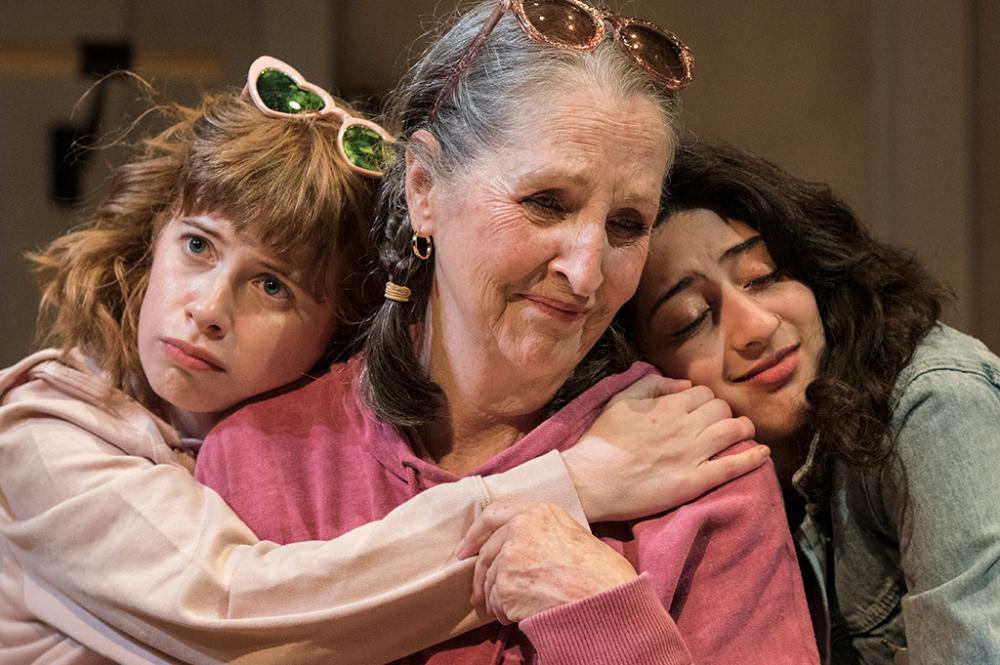 Image credit
Image credit
IJ: What advice would you give to current apprentices or anyone else pursuing a career in theatre?
JP: Trust your instincts. In every sense. In terms of knowing when you’re in the right place, knowing when you need to leave somewhere, knowing that you have the right answers that are true for you, and that in moments where it’s a no-win situation, which will happen, you can always come back to your core beliefs and what you feel in your gut. Cause there’s a lot of intellectual debate in this for a field that is really driven by the heart. And I think we should embrace that sometimes. What does your heart say?
IJ: Where would you ideally see your career going from here?
JP: There’s a scene in the play where Zuzu and Maeve are talking about what they want to do with their lives. I watch that scene, and I feel like I have that conversation every single day. All of the variations of the possibilities that life can throw at you are so out of your control that I’m just not sure that any of us can make the five year plans that we think that we are making. Because the universe might have other thoughts.
IJ: How do you feel about some of the weirder devices that Clare Barron uses in the play, like the fangs that the girls grow in a few pivotal scenes?
JP: I think the fangs are a great example of what I like to call Opposite Annie. Little girls are cute on stage all the time. That’s more fake than stage fangs. If you’ve lived as a girl, or raised a girl, or are friends with one… Whatever your interactions with girls, I hope you know that they are absolute monsters. They have all the power in the world. And I think the fangs bring an animalistic instinct, which is what we were just talking about, right? I think that they read as, when you strip everything away, and just let women be in the world without the lens we have always seen them through and forced them to squeeze into like a little ball….the core of their essence is fierce as fuck.
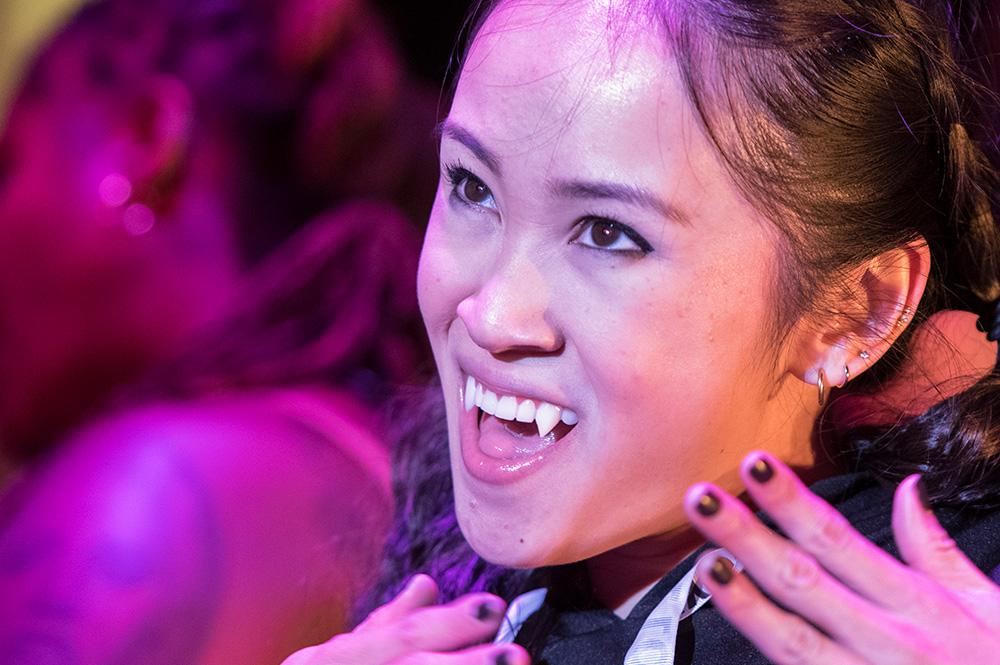 Image credit
Image credit
